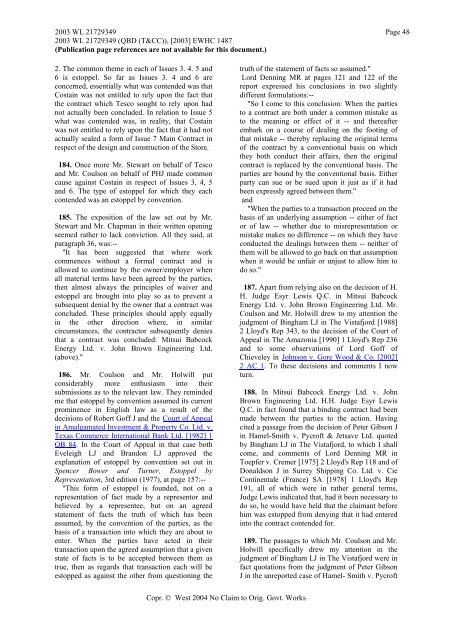Tesco v Constain - Thomson Reuters
Tesco v Constain - Thomson Reuters
Tesco v Constain - Thomson Reuters
Create successful ePaper yourself
Turn your PDF publications into a flip-book with our unique Google optimized e-Paper software.
2003 WL 21729349 Page 482003 WL 21729349 (QBD (T&CC)), [2003] EWHC 1487(Publication page references are not available for this document.)2. The common theme in each of Issues 3. 4. 5 and6 is estoppel. So far as Issues 3. 4 and 6 areconcerned, essentially what was contended was thatCostain was not entitled to rely upon the fact thatthe contract which <strong>Tesco</strong> sought to rely upon hadnot actually been concluded. In relation to Issue 5what was contended was, in reality, that Costainwas not entitled to rely upon the fact that it had notactually sealed a form of Issue 7 Main Contract inrespect of the design and construction of the Store.184. Once more Mr. Stewart on behalf of <strong>Tesco</strong>and Mr. Coulson on behalf of PHJ made commoncause against Costain in respect of Issues 3, 4, 5and 6. The type of estoppel for which they eachcontended was an estoppel by convention.185. The exposition of the law set out by Mr.Stewart and Mr. Chapman in their written openingseemed rather to lack conviction. All they said, atparagraph 36, was:--"It has been suggested that where workcommences without a formal contract and isallowed to continue by the owner/employer whenall material terms have been agreed by the parties,then almost always the principles of waiver andestoppel are brought into play so as to prevent asubsequent denial by the owner that a contract wasconcluded. These principles should apply equallyin the other direction where, in similarcircumstances, the contractor subsequently deniesthat a contract was concluded: Mitsui BabcockEnergy Ltd. v. John Brown Engineering Ltd.(above)."186. Mr. Coulson and Mr. Holwill putconsiderably more enthusiasm into theirsubmissions as to the relevant law. They remindedme that estoppel by convention assumed its currentprominence in English law as a result of thedecisions of Robert Goff J and the HCourt of Appealin Amalgamated Investment & Property Co. Ltd. v.Texas Commerce International Bank Ltd. [1982] 1QB 84. In the Court of Appeal in that case bothEveleigh LJ and Brandon LJ approved theexplanation of estoppel by convention set out inSpencer Bower and Turner, Estoppel byRepresentation, 3rd edition (1977), at page 157:--"This form of estoppel is founded, not on arepresentation of fact made by a representor andbelieved by a representee, but on an agreedstatement of facts the truth of which has beenassumed, by the convention of the parties, as thebasis of a transaction into which they are about toenter. When the parties have acted in theirtransaction upon the agreed assumption that a givenstate of facts is to be accepted between them astrue, then as regards that transaction each will beestopped as against the other from questioning thetruth of the statement of facts so assumed."Lord Denning MR at pages 121 and 122 of thereport expressed his conclusions in two slightlydifferent formulations:--"So I come to this conclusion: When the partiesto a contract are both under a common mistake asto the meaning or effect of it -- and thereafterembark on a course of dealing on the footing ofthat mistake -- thereby replacing the original termsof the contract by a conventional basis on whichthey both conduct their affairs, then the originalcontract is replaced by the conventional basis. Theparties are bound by the conventional basis. Eitherparty can sue or be sued upon it just as if it hadbeen expressly agreed between them."and"When the parties to a transaction proceed on thebasis of an underlying assumption -- either of factor of law -- whether due to misrepresentation ormistake makes no difference -- on which they haveconducted the dealings between them -- neither ofthem will be allowed to go back on that assumptionwhen it would be unfair or unjust to allow him todo so."187. Apart from relying also on the decision of H.H. Judge Esyr Lewis Q.C. in Mitsui BabcockEnergy Ltd. v. John Brown Engineering Ltd. Mr.Coulson and Mr. Holwill drew to my attention thejudgment of Bingham LJ in The Vistafjord [1988]2 Lloyd's Rep 343, to the decision of the Court ofAppeal in The Amazonia [1990] 1 Lloyd's Rep 236and to some observations of Lord Goff ofChieveley in HJohnson v. Gore Wood & Co. [2002]2 AC 1. To these decisions and comments I nowturn.188. In Mitsui Babcock Energy Ltd. v. JohnBrown Engineering Ltd. H.H. Judge Esyr LewisQ.C. in fact found that a binding contract had beenmade between the parties to the action. Havingcited a passage from the decision of Peter Gibson Jin Hamel-Smith v. Pycroft & Jetsave Ltd. quotedby Bingham LJ in The Vistafjord, to which I shallcome, and comments of Lord Denning MR inToepfer v. Cremer [1975] 2 Lloyd's Rep 118 and ofDonaldson J in Surrey Shipping Co. Ltd. v. CieContinentale (France) SA [1978] 1 Lloyd's Rep191, all of which were in rather general terms,Judge Lewis indicated that, had it been necessary todo so, he would have held that the claimant beforehim was estopped from denying that it had enteredinto the contract contended for.189. The passages to which Mr. Coulson and Mr.Holwill specifically drew my attention in thejudgment of Bingham LJ in The Vistafjord were infact quotations from the judgment of Peter GibsonJ in the unreported case of Hamel- Smith v. PycroftCopr. © West 2004 No Claim to Orig. Govt. Works
















